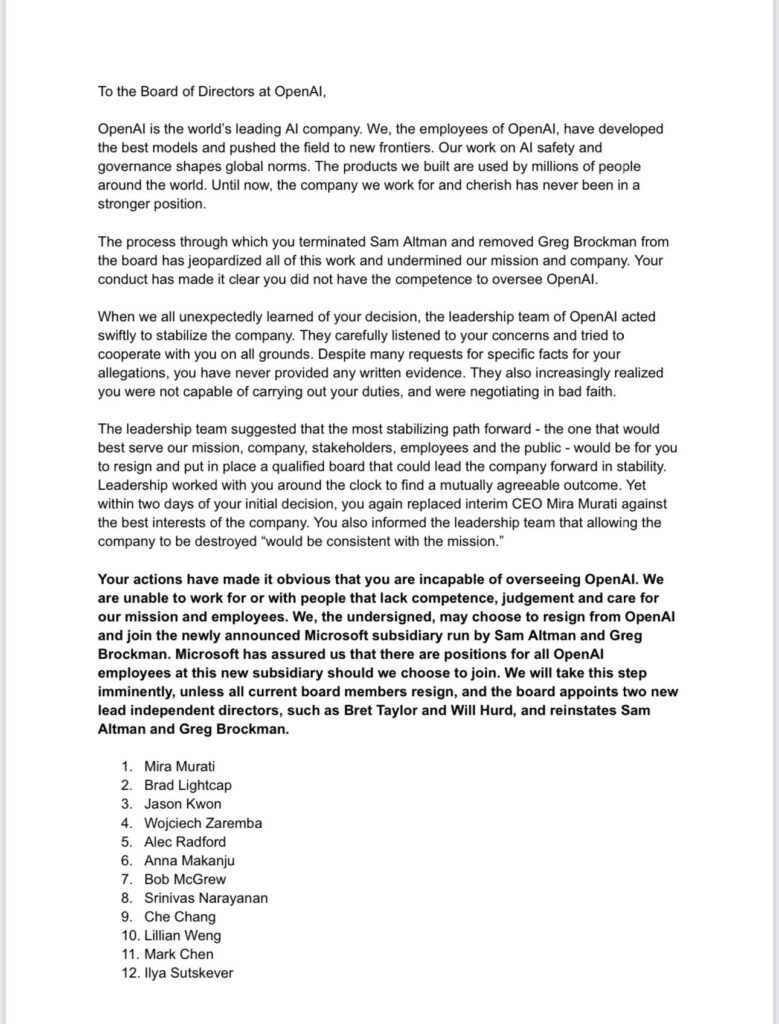Leadership changes are inevitable. However, these changes can have a significant impact on a company’s brand integrity, which is the consistency between a brand’s promise and its actions. When leadership changes occur without considering the brand’s perspective, it can lead to inconsistencies in messaging, a loss of trust with customers, and ultimately, damage to the brand’s reputation.
The recent firing of Sam Altman, the former CEO of OpenAI, serves as a stark reminder of the importance of involving marketing in leadership decisions. Altman’s dismissal was reportedly due to a breakdown in communication between him and the board of directors. It also led Microsoft (which owns a significant portion of OpenAI) to intervene and attempt to bring Sam back. This lack of transparency and communication raised concerns among OpenAI’s employees (505 of the 700 OpenAI staff signed a letter demanding the removal of the Board of Directors – the letter is below) and the broader AI community, casting a shadow over the company’s reputation.
The absence of marketing’s voice in this decision-making process highlights the potential risks of excluding marketing from leadership discussions. Marketing professionals play a crucial role in understanding and shaping brand perception, and their expertise can be invaluable in ensuring that leadership changes are handled in a way that preserves brand integrity.
Here are some key reasons why marketing should have a voice in leadership changes:
- Marketing understands the brand’s voice and messaging. Marketing professionals are intimately familiar with a company’s brand identity, including its values, tone of voice, and messaging. This expertise is essential in ensuring that leadership changes do not compromise the brand’s integrity.
- Marketing can assess the potential impact of leadership changes on the brand. Marketing professionals have a deep understanding of how customers perceive a brand and how that perception can be affected by leadership changes. This insight can help to identify and mitigate potential risks to the brand’s reputation.
- Marketing can help to develop a communication plan for managing leadership changes. Effective communication is critical during times of leadership transition. Marketing professionals can develop a communication plan that ensures transparency and consistency in messaging, both internally and externally.
The failure to involve marketing in leadership decisions can have significant consequences for a company’s brand integrity. In the case of OpenAI, the lack of transparency surrounding Altman’s firing raised concerns among employees and the public, tarnishing the company’s reputation and potentially jeopardizing its future success.
To prevent similar situations from occurring, companies should make a conscious effort to include marketing in leadership discussions. By integrating marketing’s expertise into the decision-making process, companies can ensure that leadership changes are handled in a way that protects brand integrity and preserves the trust of their customers.
Involving marketing in leadership decisions is not just a matter of best practice; it is essential for safeguarding a company’s brand integrity. By leveraging marketing’s understanding of the brand and its ability to communicate effectively, companies can navigate leadership changes without compromising the values and reputation that their brand represents.




